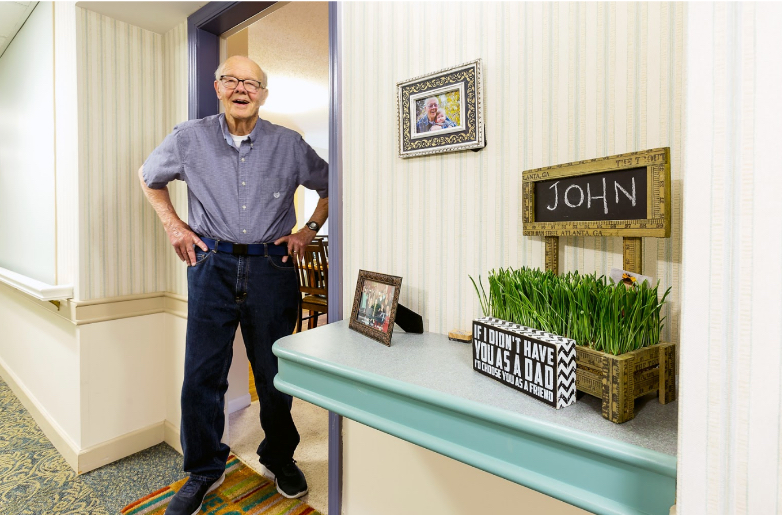Boutique Memory Care Communities That Provide a Cozy Environment
Boutique Memory Care Communities That Provide a Cozy Environment
Blog Article
Everything About Memory Care Services: Why Little Memory Treatment Homes Are an Excellent Choice
Memory care solutions play a vital role in sustaining people with Alzheimer's and mental deterioration. Little memory treatment homes stick out for their personalized strategy and intimate setting. With reduced staff-to-resident ratios, these homes foster stronger links and customized treatment. Homeowners profit from boosted social interactions and a risk-free atmosphere. As households explore alternatives, comprehending the distinct advantages of little memory care homes ends up being important. What variables should be taken into consideration when choosing the ideal home?
Understanding Memory Care Provider
While lots of may know with basic senior treatment alternatives, recognizing memory care services is crucial for households dealing with the obstacles of cognitive decrease. Memory care especially deals with individuals with problems such as Alzheimer's disease and various other types of dementia. These services offer an organized environment that concentrates on enhancing the lifestyle for locals via specialized treatment and support.Memory care facilities are created to guarantee security and safety, frequently including safeguarded environments to stop wandering. Educated employee are offered all the time to help with day-to-day tasks, drug management, and individual treatment. Additionally, memory treatment programs frequently include cognitive stimulation activities, tailored to involve locals and promote psychological health. Families can profit from comprehending these services, as they allow notified choices regarding their liked ones' care, making sure that their certain needs and choices are attended to in a compassionate and supportive way.
The Benefits of Little Memory Treatment Residences
Small memory care homes offer distinct benefits that can greatly improve the quality of life for locals with cognitive impairments. One considerable advantage is the intimate atmosphere, which allows for personalized interactions among staff and citizens. This smaller sized setup cultivates meaningful partnerships, minimizing sensations of isolation and stress and anxiety usually experienced by individuals with memory issues.Additionally, the lower staff-to-resident proportion in tiny memory care homes allows caregivers to provide even more mindful guidance and assistance. This method not only boosts safety but additionally promotes a sense of safety and security for the residents.Moreover, small memory care homes can adjust swiftly to the unique demands and preferences of each resident, permitting a more homey environment. Such a setting can motivate social interaction and involvement in tasks, eventually enriching the daily experiences of those living with cognitive problems.
Personalized Care Program for Locals
Customized care strategies are important in memory treatment homes, as they satisfy the one-of-a-kind requirements and preferences of each resident. These strategies start with comprehensive analyses carried out by competent professionals, that review cognitive abilities, case history, and personal rate of interests. This customized approach assurances that care is not just effective yet also respectful of each person's self-respect and autonomy.Moreover, customized treatment plans are versatile, permitting adjustments as homeowners' requirements progress in time. This adaptability fosters a feeling of security and familiarity, which is important for people living with memory obstacles. Caregivers are trained to carry out these strategies consistently, giving support that straightens with the citizens' routines and preferences.Ultimately, personalized care strategies boost the lifestyle for residents by promoting health, freedom, and involvement, making them a basic facet of memory treatment services in small memory treatment homes.
Developing a Home-Like Atmosphere
Developing a home-like environment is critical for cultivating convenience and experience in memory care settings, as it significantly impacts residents' psychological well-being. Tiny memory care homes commonly focus on personalized touches, such as cozy color schemes, family pictures, and acquainted furniture setups, which help residents feel extra comfortable. Incorporating aspects reminiscent of a typical home, like comfortable living areas and public locations, encourages a sense of belonging.Moreover, making use of all-natural light and outdoor rooms can improve the atmosphere, promoting leisure and harmony. Team member play a substantial duty in keeping this atmosphere by engaging with locals in a thoughtful manner, treating them like family members. Routine tasks, such as food preparation or gardening, can likewise add to a home-like feeling, providing opportunities for locals to join meaningful experiences. Generally, producing a supporting environment sustains cognitive feature and psychological stability, making it an essential aspect of memory treatment services.
Boosted Social Communication and Community
Boosted social interaction and neighborhood are vital elements of memory treatment solutions. By cultivating customized social interaction and producing a family-like ambience, these solutions advertise meaningful connections amongst homeowners. Team events and activities better urge participation, helping individuals really feel more consisted of and supported.
Individualized Social Involvement
While social interaction is necessary for overall well-being, lots of people with memory disabilities usually battle to involve meaningfully with others. Personalized social interaction in memory treatment homes addresses this difficulty by creating tailored tasks that deal with citizens' one-of-a-kind rate of interests and abilities. By focusing on individual preferences, caregivers can promote links that resonate deeply with everyone. Activities such as art therapy, music sessions, and led discussions advertise cognitive excitement and psychological expression. Additionally, tiny team settings encourage friendship and enable more intimate communications, improving sensations of belonging. This technique not only battles feelings of seclusion yet also encourages homeowners to maintain a sense of identification, inevitably adding to improved mental health and lifestyle.
Family-like Environment
In a memory treatment setting, fostering a family-like atmosphere substantially boosts social interaction and builds a sense of neighborhood among homeowners. Smaller sized memory treatment homes usually focus on intimate settings, enabling locals to develop closer links with one another and team members. This nurturing environment advertises depend on, which is essential for people with memory disabilities. Citizens are a lot more most likely to talk and share experiences, developing an encouraging network that eases sensations of solitude. The knowledge of common areas and regimens adds to a feeling of belonging, additionally urging social communication (personalized memory care). In such settings, psychological bonds thrive, bring about enhanced total well-being and a better of life for homeowners as they browse their daily experiences together
Group Activities and Events

Security and Safety Functions in Small Homes
Numerous small homes made for memory care incorporate crucial security and safety and security attributes to guarantee the health of homeowners. These homes commonly use secure entrance and departure points to prevent straying, a typical problem among individuals with memory problems. Additionally, security systems and alarm system devices boost tracking, guaranteeing that team can without delay reply to any kind of unusual activities.Interior designs are tailored for security, with decreased dangers such as clutter-free pathways and sharp edges. Handrails and non-slip flooring are typically installed to decrease the threat of drops. Employee are trained in emergency situation methods, guaranteeing they are planned for different situations.Moreover, individualized care plans may consist of analysis of specific safety and security requirements, offering tailored solutions for each resident. In general, these safety and protection features develop a caring environment where citizens can flourish while maintaining their self-respect and independence.
Just how to Select the Right Memory Care Home
Exactly how can households assure they pick one of the most appropriate memory treatment home for their loved ones? The choice needs careful consideration of numerous elements. Families ought to review the center's team qualifications and training, guaranteeing that caregivers are experienced in taking care of memory-related conditions. Next, it's important to examine the home's setting, concentrating on safety and security attributes and whether it cultivates a sense of area and belonging. Going to the center can offer understanding Our site into everyday activities and the social ambience, which are important for psychological stimulation and psychological health. Additionally, households ought to inquire about the treatment strategies offered, guaranteeing they are tailored to individual needs. Ultimately, thinking about the home's place see this here and availability for family members brows through can contribute to a smoother shift. By resolving these facets, households can make an educated choice that prioritizes their liked one's convenience and top quality of life in a memory treatment setting.
Frequently Asked Questions
What Credentials Should Team Members in Memory Care Residences Have?
Team member in memory care homes must possess relevant qualifications, experience in mental deterioration care, strong communication skills, and concern. Recurring training in behavior management and healing treatments improves their capability to sustain residents successfully.
How Do Memory Treatment Services Differ From Standard Assisted Living?
Memory treatment services focus particularly on individuals with memory disabilities, offering specialized support and structured atmospheres. In comparison, standard assisted living offers basic assistance with everyday tasks, doing not have the tailored approach needed for those with cognitive obstacles.
What Types of Tasks Are Offered in Memory Care Homes?
Memory care homes commonly offer a range of tasks developed to engage citizens. Typical options include art therapy, songs sessions, cognitive video games, workouts, gardening, and get-togethers, all targeted at boosting wellness and cognitive feature.
Can Locals Bring Their Own Items to Memory Treatment Houses?
Locals can commonly bring their own possessions to memory care homes, permitting them to personalize their home - personalized memory care. This technique assists create a familiar setting, advertising convenience and a feeling of identification for the individuals

Just How Are Family Members Participants Associated With the Care Process?
Member of the family play an essential function in the care procedure, frequently joining decision-making, participating in treatment conferences, and offering emotional assistance. Their involvement fosters a collaborative setting, boosting the citizen's total well-being and lifestyle. While many might be familiar with basic elderly treatment choices, comprehending memory treatment solutions is vital for households facing the difficulties of cognitive decline. These services offer a structured environment that concentrates on improving the high quality of life for citizens through specialized care and support.Memory treatment facilities are created to ensure security and safety, typically including safeguarded settings to protect against straying. Personalized treatment strategies are vital in memory care homes, as they provide to the one-of-a-kind needs and choices of each local. Personnel members in memory care homes must possess relevant certifications, experience in dementia treatment, solid interaction skills, and compassion. Memory treatment solutions concentrate especially on people with memory problems, offering specific assistance and structured environments.
Report this page